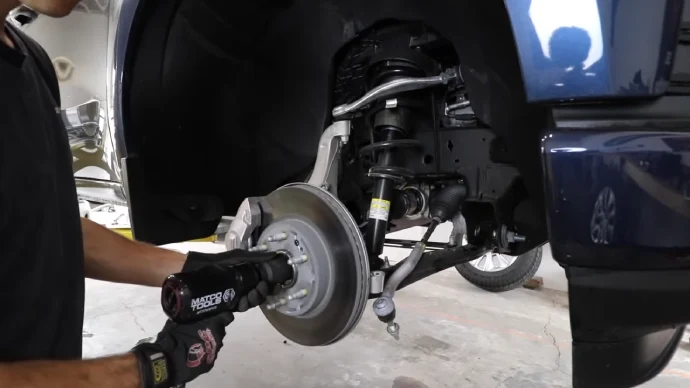Last Updated on April 16, 2023
Make your ride truly unique with a lift kit. From increased ground clearance to an impressive exterior look, this is one of the best ways to customize and stand out from other vehicles. But before you get started, it’s important that you know how much money it’ll take for professional installation.
Prices can range from as low as several hundred dollars up to more than a thousand dollars, depending on factors like size and complexity of the job, type of kit chosen, and installer. With some clever planning, you may find yourself with extra cash in hand when it’s all said and done.
Join us as we explore and discover all that goes into finding yourself an unbeatable deal.
How Much Does It Cost to Install a Lift Kit: Know Approximate Price
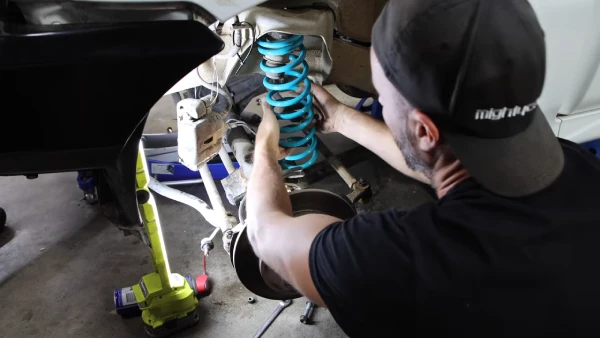
The cost of installing a vehicle lift kit can vary depending on the size or type selected. Taking these factors into account will help you determine how much you need to budget for your upgrade project.
1. Size of lift kits
Vehicle enthusiasts can select from three lift kit sizes to customize their vehicle: small, medium, or large. Whether you’re looking for an extra boost in the grandeur of your ride or a more aggressive off-roading style, there’s something to meet everyone’s needs and preferences.
I. Small Lift Kits:
Small lift kits are ideal for those looking to give their vehicle a subtle, yet noticeable appearance upgrade. These kits typically involve lifting the body of the car anywhere from 1 to 2.5 inches, allowing for the installation of larger-than-stock tires and giving your car an overall more rugged look.
Installation costs are typically quite reasonable, ranging from around $400 to $1200, depending on the complexity of the installation and its location. And thankfully, most installations do not require too many components or a specialized set of tools. It can usually be done within a few hours with basic hand tools.
Installation of a small lift kit often involves replacing the coil springs, shock absorbers, control arms, sway bar links, bump stops, and brake line extensions.
Nevertheless, the cost might rise sharply for more complex installations involving larger lifts or fabrication work. In those cases, preparing for additional time and fees associated with more in-depth projects is important.
II. Medium Lift Kits:
Medium lift kits offer a great balance between small lifts and large ones, consisting of 3 – 5 inches of suspension lift. These lifts provide just enough height for large tires (up to 33 inches) but still maintain enough clearance for off-roading activities like rock crawling or sand dune riding.
You can expect to pay around $3,000 and $12,000 for a medium lift kit installation. Though prices may be lower or higher within that range depending on the supplier and their overhead costs. With proper research, you can get the most value for your money when investing in a medium lift kit installation.
Although their installation can be expensive, the cost varies depending on location. It is important to do your research and shop around for the best deal in order to save money.
Medium lift kits require more parts than smaller ones such as new front coils, add-a-leafs in the rear suspension, new rear springs and shocks. This makes for a more complicated installation process that requires more time and labor which is reflected in the higher cost.
It’s also important to note that with any kind of lift kit it’s important to monitor your vehicle closely for any changes or signs of wear or tear on components due to driving conditions or terrain.
III. Large Lift Kits:
Large lift kits are designed to really take your vehicle’s appearance up a notch by providing maximum ground clearance and huge tire sizes. With these kits, you can raise the body of your car by six inches or more, giving it a much more imposing stance.
Installation costs of large lift kits will generally be higher than that of small or medium lift kits due to the complexity and amount of components included in them. Typical installation costs range anywhere from $11,000 to as much as $14,000 depending on what kind of kit is being installed and who is doing it (professional/self).
Professional installation times can range between 8-10 hours or more depending on experience. They help ensure that any modifications needed are done quickly and accurately.
Thereby avoiding any unnecessary time wastage or damage which could occur through incorrect installation. Experienced technicians are thus essential when it comes to installing large lift kits.
2. Type Of Lift Kit:
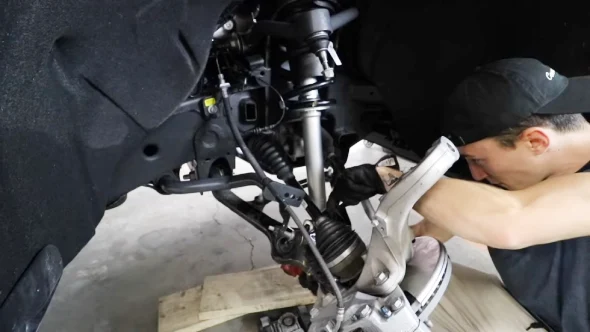
The type of lift kit you choose for your vehicle will impact the cost. There are two types of lift kits available: body lift kits and suspension lift kits. While both types raise your vehicle, they do so in different ways, resulting in different prices.
I. Body Lift Kits
When it comes to a body lift kit, they are a cheaper alternative to suspension lift kits because they don’t involve as many parts or as much labor when installing. Body lifts only raise the cab area of the vehicle, allowing for larger tires while keeping the suspension in place.
Prices for body lifts range from around $200-$1000, and installation can range from around $100-$500, depending on the complexity of the installation job. Another cost factor to consider when considering a body lift is whether your vehicle’s exhaust system must be modified to fit.
This can add an extra cost to your bill, so it’s essential to know if this is something you’ll need before making a decision.
II. Suspension Lift Kits
Suspension lift kits are generally more expensive than body lifts due to their increased complexity and labor-intensive installation process. When opting for a suspension lift kit, not only will you get more ground clearance but also bigger tires with less risk of bottoming out over rough terrain, perfect for off-roading.
Prices for a basic suspension kit can range from $300-$2,000 depending on make and model, while installation costs vary between $400-$1,200 depending on complexity. Additional costs may include alignment or steering stabilizers after installation, as well as custom components like brake lines or driveshafts.
How Much Does It Cost to Install a Lift Kit: Factors That Affect
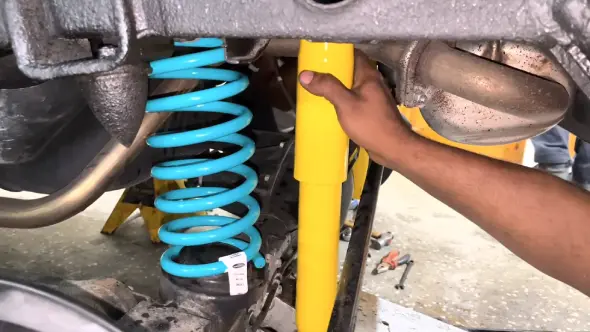
Lift kits for your vehicle can be surprisingly expensive due to various factors, from labor rates to vehicle compatibility and availability of parts. To get the best value for money when installing a lift kit, it is essential to consider all of these elements carefully.
Labor Rates and Other Fees Charged by Professionals
The cost of labor to install lift kits can vary widely depending on your area. The skill level of the mechanic performing the work and additional fees they may charge for materials, parts, and miscellaneous supplies.
The most common costs include an hourly rate for labor and a flat installation fee. It’s essential to do some research ahead of time to find out what prices to expect in your area so you can budget accordingly and avoid any surprises.
Vehicle Compatibility with the Lift Kit
Before you purchase a lift kit for your vehicle, it’s essential to ensure that it will be compatible with all parts and components. Depending on the make and model of your car or truck. There may be specialty parts or extra labor hours needed to properly install the lift kit.
If that’s the case, it could affect both the cost of materials and labor associated with installation. Tires, brakes, and suspension parts from big companies provide a reliable degree of quality that’s trusted across the globe for its consistency in fitment and performance.
Availability of Quality Aftermarket Parts
Researching which aftermarket parts best suit your needs while still staying within your budget is key to choosing aftermarket parts for your lift kit installation. You may find generic replacement parts available online, but those are not always reliable when it comes down to quality and performance.
Many people assume that getting the best value for their money means compromising on quality, but thankfully that’s not always true. Reputable name brands often offer high-quality products at prices more accessible than OEM items.
This is because they use materials and components of slightly lower standards than OEM equipment. Yet still, provide excellent performance that meets our needs and expectations. Getting similar equipment without breaking the bank is always nice, even if you have to pay more to get an efficient system.
Note: There is also an option of purchasing used or refurbished parts from certain vendors which can help reduce overall costs.
Brand and Model of Lift Kit
When looking to purchase and install a new lift kit, it is important to consider not only the type of vehicle the installation is being done for but also the brand and model of the leveling kit itself. Different brands may offer more features or have compatibility issues that can raise costs significantly when compared side by side.
Spending too much money on unnecessary upgrades or compatibility issues is easily avoided by understanding what you need before the initial purchase. Companies often try to upsell, but it’s important to realize if additional items are truly necessary.
Cost of Optional Add-Ons
When installing a lift kit, there may be additional costs associated with optional add-ons such as light bars & brackets, cab mounts, side steps, etc. Depending on what type of modifications you’re looking to get out of setup once completed.
Despite that, even after everything has been installed correctly, tune alignments might still be necessary to ensure an optimal working condition system. Over time, these services, usually provided by professional tuners, can result in better handling and increased driving safety.
Locations
The location where your lift kit is installed can also affect the cost of installation substantially. If you choose to have it professionally installed at home, it will typically be slightly more expensive than if done in a garage shop.
Home services usually require extra tools and materials that need to be provided by the installer. Additional labor costs associated with traveling out of their way for the job which results in higher fees overall. Oftentimes upwards of $1000 or more.
Garage shop installations tend to be cheaper because they already have access to all of the necessary tools and materials needed for the job. So you don’t carry additional costs for professional travel at your home.
Is It Possible to Buy a Lift Kit And Install It Yourself?
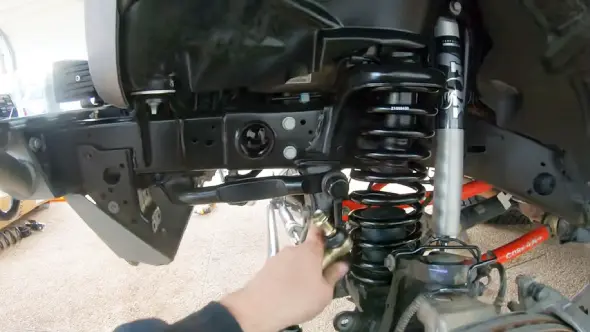
If you have the know-how, it’s possible to upgrade your ride and give yourself a lift! All that is needed for such an ambitious project are properly proportioned steering linkage, sway bars, brake lines, and shocks.
Researching which parts fit your vehicle’s suspension system and making any necessary modifications could make all the difference. You should also consider whether or not you have the necessary tools and knowledge to complete the installation safely.
An experienced mechanic can help ensure this is done correctly to maintain the integrity of your vehicle’s suspension system. Plus, many automotive stores offer installation services for lift kits at an extra cost if you feel confident that you cannot do it yourself.
Can Any Mechanic Install a Lift Kit on Jeep?
Any mechanic is capable of installing a lift kit on a Jeep. However, the installation’s complexity and the mechanic’s experience level will determine how long it will take to complete the job.
More experienced mechanics may be able to complete the lift kit installation quicker since they are familiar with the specific parts and know-how required for a successful completion.
How Long Does It Take to Install Lift Kit on Jeep?
The time it takes to install a lift kit on a Jeep can vary greatly but typically takes between one and fifteen hours. It depends on factors such as the complexity of the jeep lift kit, the type of jeep being modified, and the experience level of the mechanic performing the work.
More experienced mechanics with higher-level tools and knowledge can typically complete the job quicker than those lacking in either category.
What Does It Cost to Put A 2-Inch Lift On a Truck?
The cost of lifting a truck by two inches depends on several factors, including the type of truck, type of lift kit being installed, materials used in the construction of the lift kit itself, labor costs if professional installation is requested or required, etc.
In general terms, most truck lift kits range in price from around $400 up to $12,000, depending on the complexity and quality of components used. Therefore, it is advisable to do some research before purchasing to get an accurate estimate tailored to your own specific needs.
Does a Lift Kit Add Value To a Vehicle?
Upgrading your ride with a lift kit can not only give you an edge in terms of looks and performance, but it also has the potential to generate more value for resale. From neck-turning aesthetics to improved driving dynamics, installing a lift will definitely pay off.
Aside from this, buyers may be more likely to purchase a vehicle that has been customized with a lift kit, making it easier for you to sell the car at a higher price. Meanwhile, many lift kits can also improve the clearance of your car, which makes it more suitable for off-roading and other similar activities.
Will Vehicle Insurance Increase With a Lift Kit Installed?
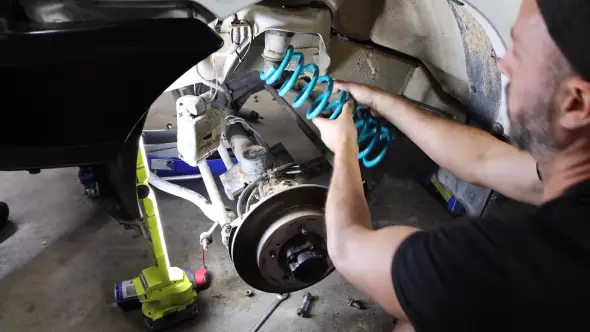
No, typically, installing a lift kit on your car will not cause an increase in insurance premiums. This is because lifted trucks are usually not seen as high-risk vehicles on the roads. Therefore, insurers generally do not see them as particularly risky investments that need to be insured at higher rates.
The only instance where you could face an increase in insurance premiums is if the lift kit requires additional parts that need to be insured separately. Such as larger tires or special suspension components, in which case you would be expected to pay extra for those specific components.
Unlock Savings: Preparing for Lift Kit Installation
With the right preparation, you can get a great deal on installing that lift kit. Just be sure to consider all accompanying factors like labor costs, materials required, and extra services. Doing your research carefully will ensure an efficient upgrade without breaking the bank.
No matter how much it costs, having a lifted truck is worth every penny. There’s nothing quite like driving down the road in style.
